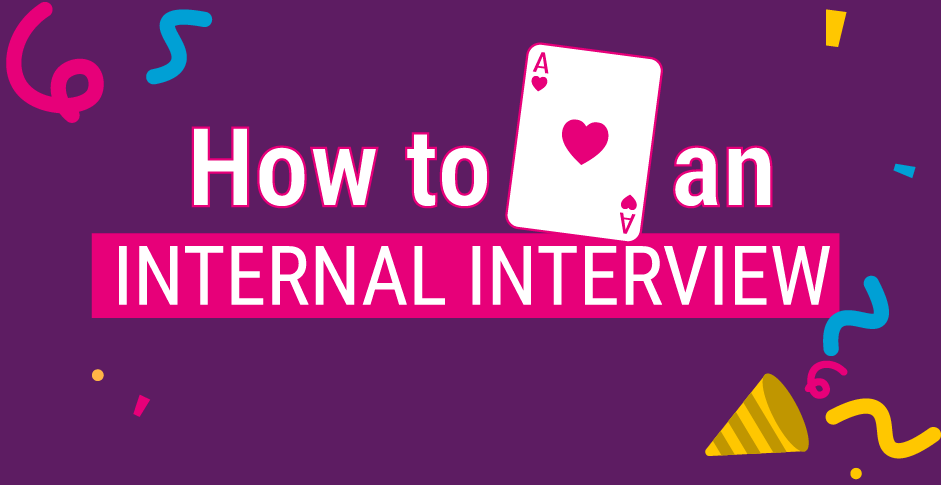How to ace an internal interview
So you’ve been given the opportunity to interview for an internal role? There are some key things that can help you succeed.
An internal interview is when you go for a job at an organisation you’re already working for. While the aim of both internal and external interviews is to find the right person for a vacant position, there are differences in how an interview may unfold.
Understanding the differences between an internal and external interview from an employer’s perspective will give you the best chance of landing the role you want.
How to prepare for an internal interview
It’s important to remember that your interview is just that – an interview. It’s not an informal conversation, but an opportunity for your employer to make sure you have the competencies and that you’re the right fit for the role.
“Our advice to team members is to use the opportunity to learn more about how they are perceived and areas for development, and to prepare fully for the interview process,” says Jodette Cleary, the Chief People Officer at online trade marketplace Hipages.
There are five key elements to acing your internal interview.
- Act like an external candidate
At Hipages, existing team members are asked to provide a cover letter and update their resume when applying for a new position. “It’s important to take the process seriously,” says Cleary. “Internal applicants need to participate fully alongside external applicants, such as if there is a role-play or a presentation as part of the interview process.”
It’s also important to hit the right tone – you may know the people interviewing you, but you still need to be professional throughout the interview and dress appropriately.
- Use your knowledge to your advantage
While having inside knowledge about the organisation, its values and the way it operates is undoubtedly an advantage, it’s still crucial to do your homework. Ensure you are familiar with the company’s current vision and mission and goals for the future. If the new job is in a different team, ensure you familiarise yourself with their current projects and workload.
You can set yourself apart from other candidates by talking about and emphasising your organisation-specific experience, knowledge, contacts and skills when answering interview questions. If you have insight into the challenges or opportunities that relate to the role, make sure you’re go in with some thinking or ideas about these in case they come up.
- Ask questions
Be curious about the new role and look at the interview as a fresh opportunity – one where you can ask questions about the position, the potential challenges and the performance expectations.
Your knowledge of the company and different aspects of the business can come in useful here. It’s a great way to show what you understand and the value you could bring to the position. But equally don’t let your eagerness to share what you know prevent you from understanding what the hiring manager is looking for.
- Be prepared to challenge pre-conceived ideas
Internal candidates don’t have the same advantage as external candidates because employers often think they know internal employees well. Cleary suggests that if there are certain responsibilities in the new role that you don’t have experience with, be prepared to challenge or reshape the interviewers’ opinion.
“You can say things like ’I haven’t had direct experience with that, however I’d like to tell you about how I would approach that situation’ to pivot from toward something positive,” she says.
- Share your accomplishments
An internal interview is an opportunity to highlight your skills and achievements. As an existing member of stuff, you might be inclined to assume a hiring manager knows what you’ve achieved, but this isn’t always the case. “Be sure to remind the interviewers of the value you bring to the organisation. Emphasise any particular accomplishments and how they have benefited the company,” says Cleary.
What to be aware of before your internal interview
It may not be appropriate to talk to your colleagues about the new role and gather information that may not be in the job description, especially given you may be competing with workmates for the role. “We advise internal applicants to act professionally throughout. They should understand that it is not appropriate to discuss other team members’ suitability for the role but to focus on their own application,” says Cleary.
According to Cleary, internal applicants are a great resource to a company as they are already familiar with the ethos, culture and operations of the organisation. “Wherever possible our preference is to promote or provide a new opportunity to an existing team member rather than hire from outside,” she says.
Internal interviews provide an exciting opportunity to move laterally within an organisation or to take on a completely new role. By taking the time to prepare your application, refresh your understanding of the company’s values and mission, and highlight your previous achievements, you’ll be set to ace your internal interview.
